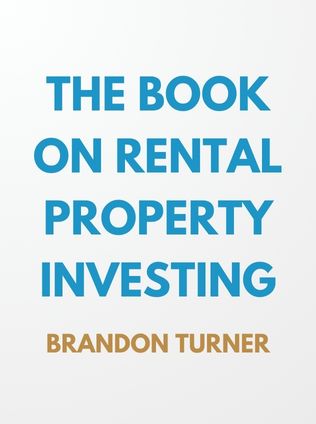
The Book on Rental Property Investing
How to Create Wealth With Intelligent Buy and Hold Real Estate Investing (BiggerPockets Rental Kit, 2)
By Brandon Turner
Published 10/2015
About the Author
Brandon Turner is a highly successful real estate investor, educator, and author. With a portfolio of hundreds of income-generating properties, Turner has established himself as a leading figure in the world of real estate investment. He is best known for his role as a former host of the BiggerPockets podcast, a platform that has become a go-to resource for real estate investors seeking to learn from experts in the field. Turner’s writing is characterized by its practicality, relatability, and a deep understanding of the challenges and opportunities that come with real estate investing. His works, including The Book on Rental Property Investing, are widely regarded as essential reading for anyone serious about building wealth through real estate.
Main Idea
The central theme of "The Book on Rental Property Investing" is to provide a comprehensive guide for aspiring and experienced real estate investors alike. Turner outlines the entire process of investing in rental properties, from the initial stages of finding and financing a property to the ongoing management and growth of a rental portfolio. He emphasizes the importance of strategic planning, understanding market dynamics, and building a reliable team to support your investment endeavors. The book is designed to equip readers with the knowledge and tools necessary to navigate the complex world of real estate investing, avoid common pitfalls, and achieve long-term financial success.
Table of Contents
- Introduction to Real Estate Investment (REI)
- How Rental Properties Make Money
- Strategies for Getting Started in the Rental Property Industry
- Members of Your Real Estate Team
- Selecting Properties
- Lending Options
- Purchasing Properties
- Managing Properties
Introduction to Real Estate Investment (REI)
In the introduction, Turner sets the stage by explaining the basics of real estate investment (REI). He covers the fundamental concepts that every investor needs to understand before diving into the market. Real estate investment is presented not just as a means of generating income, but as a strategic approach to building long-term wealth. Turner discusses the different types of real estate investments, including residential, commercial, and industrial properties, and how each can fit into an investor’s overall financial strategy.
Turner stresses that real estate is a business, not a hobby, and it requires a solid understanding of financial principles, market dynamics, and risk management. He introduces the concept of cash flow, which is the income generated from a rental property after all expenses have been paid. Cash flow is essential because it allows investors to sustain their investments, reinvest in more properties, and eventually achieve financial independence.
Turner also highlights the importance of understanding market cycles and being prepared for the inevitable ups and downs in the real estate market. He encourages readers to adopt a long-term perspective, focusing on building a portfolio of properties that will generate steady income over time, rather than chasing quick profits.
How Rental Properties Make Money
Turner identifies four primary ways in which rental properties generate income, each of which plays a crucial role in building wealth through real estate:
- Cash Flow: Cash flow is the most immediate and tangible source of income from rental properties. It is the money that remains after all expenses, such as mortgage payments, property taxes, insurance, and maintenance costs, have been paid. Turner emphasizes that positive cash flow is critical to the success of any rental property investment, as it not only provides immediate returns but also funds future investments. He advises investors to focus on properties that generate positive cash flow from day one, rather than relying on speculative appreciation or other uncertain income sources.
- Tax Benefits: One of the often-overlooked advantages of owning rental properties is the array of tax benefits available to real estate investors. Turner explains that governments often provide tax incentives to property owners who provide housing, recognizing the economic benefits of rental properties. These benefits can include deductions for mortgage interest, property taxes, depreciation, and even some repair and maintenance expenses. By taking full advantage of these tax benefits, investors can significantly reduce their tax liabilities, thereby increasing their overall return on investment.
- Appreciation: Over time, the value of real estate tends to increase, a phenomenon known as appreciation. Turner explains that appreciation can occur naturally, as a result of broader economic factors such as inflation, supply and demand, and market growth. However, investors can also create forced appreciation by making improvements to a property, such as renovating kitchens and bathrooms, adding new features, or enhancing curb appeal. Forced appreciation allows investors to increase the value of their properties more quickly and can be a powerful tool for building equity and generating higher returns.
- Loan Paydown: As tenants pay rent, a portion of that income goes toward paying down the mortgage on the property. Over time, this reduces the principal balance of the loan, increasing the investor’s equity in the property. Turner points out that this process, known as amortization, is a key component of wealth building in real estate. As the loan balance decreases and the property appreciates in value, the investor’s equity grows, providing a solid financial foundation for future investments.
“The key to successful real estate investing lies in understanding these income streams and leveraging them effectively.” — Brandon Turner
Turner’s emphasis on these four income streams underscores the importance of a holistic approach to real estate investing. By focusing on generating positive cash flow, maximizing tax benefits, creating appreciation, and paying down loans, investors can build a sustainable and profitable rental property portfolio.
Strategies for Getting Started in the Rental Property Industry
For those new to real estate investing, Turner provides practical advice on how to get started. He discusses the importance of leveraging other people’s money (OPM) through financing options like mortgages. This allows investors to control valuable assets with a relatively small initial investment, amplifying their potential returns. However, Turner also warns that leverage comes with risks, particularly the risk of overextending oneself financially. He advises investors to carefully assess their financial situation and choose properties that generate enough cash flow to cover their mortgage payments and other expenses.
Turner also discusses the concept of house hacking, a popular strategy for beginners. House hacking involves purchasing a multi-unit property, living in one unit, and renting out the others. This strategy allows investors to generate rental income while also benefiting from owner-occupied financing options, which often come with lower interest rates and down payment requirements. House hacking is an excellent way for new investors to get started with minimal risk and build equity over time.
Another strategy Turner recommends is investing in Real Estate Investment Trusts (REITs). For those who may not have enough capital to purchase a property outright, REITs offer a way to invest in real estate with a lower initial investment. REITs are companies that own and manage income-generating real estate, and they allow investors to buy shares in a diversified portfolio of properties. REITs provide a passive investment option that can generate steady income through dividends, making them an attractive option for those who want to invest in real estate without the responsibilities of property management.
Sign up for FREE and get access to 1,400+ books summaries.
You May Also Like
Rich Dad Poor Dad
What the Rich Teach Their Kids About Money - That the Poor and Middle Class Do Not!
By Robert T. KiyosakiFreakonomics
A Rogue Economist Explores the Hidden Side of Everything
By Steven D. Levitt and Stephen J. DubnerThe Lean Startup
How Today's Entrepreneurs Use Continuous Innovation to Create Radically Successful Businesses
By Eric RiesFactfulness
Ten Reasons We're Wrong About the World – and Why Things Are Better Than You Think
By Hans RoslingThe Ride of a Lifetime
Lessons Learned from 15 Years as CEO of the Walt Disney Company
By Robert Iger



















